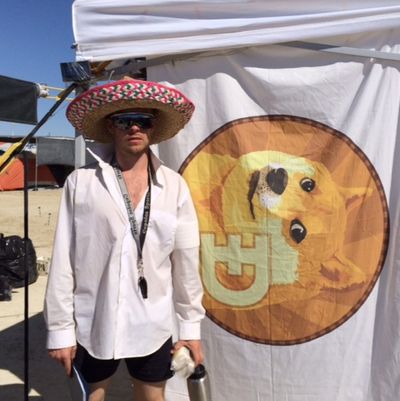
It’s three in the afternoon on my second day of Burning Man, and I’m listening to a man in bike shorts and a sombrero explain to me that the future of government looks a whole lot like a web-based cryptocurrency named after a 4chan meme.
“It’s all crowdfunded, open, decentralized,” he says. “I totally think it could work.”
The man is Gary Lachance, a Canadian who is heading up one of Burning Man’s odder encampments — Camp Dogecoin. Camp Dogecoin is a group of cryptocurrency enthusiasts named after a jokey Bitcoin offshoot called Dogecoin, which in turn is named after the meme of a grammatically challenged Shiba Inu puppy.
The camp was originally called Camp Bitcoin, but organizers decided to change it just days before, in part because Burning Man leadership frowned on celebrating any type of legitimate currency at the money-free festival, virtual or not. Like Bitcoin, Dogecoin is a virtual currency with a decentralized “blockchain” that keeps a record of every transaction. Its members are mostly Canadian, though there is an American contingent, and at least one Bitcoin enthusiast from Indonesia showed up.
Lachance, who is also wearing an open-collared white shirt and sunglasses with a rhinestone rim, says he first got involved with Bitcoin in 2011, while taking part in the Occupy Vancouver movement. Unlike Bitcoin moguls like Tyler and Cameron Winklevoss, who have made millions from their cryptocurrency investments, he missed out on Bitcoin during its lucrative early days and owns only a modest amount now. “I don’t even have enough to cover my credit-card debt,” he says, when I press for specifics.
In Lachance’s hand is a blue folder outlining a talk he’s about to give. The subject? “Radical transparency,” his idea for transforming government by dismantling institutions like Congress and the Federal Reserve and replacing them with a system of decentralized trust similar to Bitcoin’s blockchain. “PRIVACY IS THE ENEMY” is written on the title page of his speech in large, red scrawl. Underneath: “True freedom will be attained when all information is liberated.” In Lachance’s Bitcoin world, there would be only one law — no using unprovoked force against another person or his or her property — and every citizen would wear a video camera at all times, with the recordings fed into an open database that could be used to settle disputes and ensure accountability.
“America was more decentralized in the past,” says a nearby Camp Dogecoin member, who is drinking a carton of MuscleMilk out of a straw. “When you’re talking about radical decentralization, you’re taking it back to the way it was.”
“It would look a lot like Burning Man, actually,” Lachance adds, standing next to a large flag with the Dogecoin logo. Nearby, a Darth Vader helmet sits on a table next to a woman eating trail mix out of a large bag.
Camp Dogecoin has attracted a number of interested outsiders, including Scott Beibin, a Philadelphia-based booking agent who says he’s more a fan of Dogecoin than its better-known predecessor.
“Bitcoin is the grandpa coin,” Beibin says. “It’s stodgy, and it’s been stagnant for a very long time. The people building for Bitcoin are, like, office workers. But office workers aren’t innovators. Kids in a basement are innovators!”
Beibin likes Dogecoin, he says, because it’s still inexpensive enough for non-rich people to experiment with. (One Dogecoin is worth about 0.00000035 Bitcoin.) “Bitcoin is in a space where people are trying to figure out how to navigate an institution,” he says, “whereas Dogecoin is used as an actual currency. It’s a Shitcoin.” He means “Shitcoin” as a good thing.





























